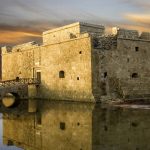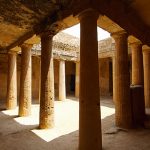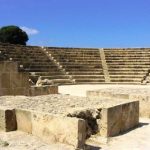General Information
Paphos, a city rich in history and culture, is the gem of western Cyprus. Believed to be the birthplace of Aphrodite, the Greek goddess of love and beauty, Paphos proudly boasts the remains of palaces, theatres, fortresses and tombs that belong to Classical, Hellenistic and Roman periods. There is also archaeological evidence supporting the city’s existence from the Neolithic period.
All these elements and facts give Paphos a remarkable architectural and historical value, and this is mostly why the town of Paphos with the Mosaics palaces and Tombs of the Kings, is included in the official UNESCO list of cultural and natural treasures of the world’s heritage.
Paphos was valued as a major port and the capital of Cyprus during Roman times.
Today, this small harbour with a population of about 32,754, has slowly and steadily emerged as an attractive, popular tourist destination. Ktima is the main residential district while Kato Paphos, by the sea, is built around the medieval castle and contains most of the luxury hotels and the entertainment infrastructure of the city. Hundreds of shops, restaurants, bars and a newly built shopping mall complete the picture of this exceptional town.
In the district of Paphos and within a half an hour drive away, one can visit numerous picturesque villages with traditional tavernas, churches and archaeological sites. Polis, Akamas Peninsula, Aphrodite’s Rock, Peyeia, Argaka, Lara Bay with the Caretta- Caretta turtles are just a few to name.
Paphos, along with Aarhus, Denmark, will be the European Capitals of Culture for 2017.
Top Paphos Landmarks
Birthplace of Aphrodite – Aphrodite’s Rock – Petra Tou Romiou
Named after the Greek Goddess of love and beauty Aphrodite, the rock located between Limassol and Paphos is believed to be sacred. Legend says that this is the point where Aphrodite emerged from the sea in a surge of amazing sea foam. She herself chose this rock as the ideal location to begin her life as a mortal.
Paphos Castle
Located on the edge of the harbour, Paphos Castle is one of the most famous landmarks of the city. A number of archaeologists have taken an interest in excavating and investigating the castle as it dates back to the Roman era. The Byzantine fort, originally built to protect the harbour was destroyed because of an earthquake in 1222. It was then rebuilt by the Luisignans in the 13th century and since then has seen a few more reconstructions till date.
Tombs of the Kings
Tombs of the Kings is a large burial ground with many underground tombs that date back to the 4th century BC and are sculpted out of solid rock. Believed to be the burial sites of Paphian aristocrats and high officials, some of the tombs have frescoed walls and Doric columns. The tombs are listed in the UNESCO World Heritage Sites.
Paphos Archaeological Park
Paphos archaeological Park is famous for sites and monuments that date back from prehistoric times to the Middle Ages. Spectacular mosaic floors of four Roman villas are the highlight of Paphos Archaeological Park.
Akamas Peninsula
The most beautiful location on the entire island, the Akamas Peninsula, a protected national park, covers approximately an area of 230 km2, surrounded by mountains and forests. Because of its ecological significance, the Akamas peninsula is not only a tourist attraction, but also of great interest for botanists from all over the world.





